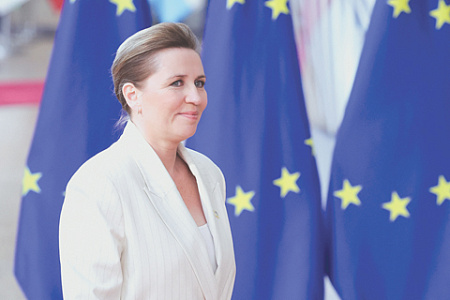
Under the banner “A strong Europe in a changing world,” Denmark has taken the helm of the European Union Council for a six-month term with a clear and assertive agenda. The presidency’s primary focus will be on bolstering the bloc’s security and defense capabilities, providing unwavering support for Ukraine, and confronting what it defines as growing threats from Russia.
Following the hawkish stance of its predecessor, Poland, Copenhagen is set to champion a significant increase in national defense spending across the EU. A key priority will be strengthening the protection of critical infrastructure, such as undersea cables and pipelines, which have become focal points in an era of hybrid warfare. This security-first approach signals a continuation and intensification of the EU’s pivot towards a more robust defense posture in response to regional instability.
Denmark is also poised to be a forceful advocate for tightening the economic screws on Moscow. The presidency will push for an 18th package of sanctions against Russia and will be tasked with persuading more hesitant member states, such as Hungary and Slovakia, to fall in line. Copenhagen’s proposals include a complete EU ban on remaining Russian energy imports and novel restrictions targeting the “shadow fleet” of tankers transporting Russian oil, potentially using international environmental law as a justification for intervention in the Baltic Sea.
Unconditional support for Kyiv remains at the core of the Danish agenda. Having already committed over $7.5 billion in aid, Denmark will continue to spearhead efforts for military, financial, and political assistance to Ukraine. In a landmark initiative, Denmark is also set to become the first nation to launch joint arms production with Ukraine, underscoring a deep commitment to enhancing Kyiv’s long-term defense capabilities and integrating its defense industry with Europe’s.
On the diplomatic front, the Danish presidency is determined to advance EU enlargement negotiations with Ukraine and Moldova, despite a persistent blockade by Hungary. Officials have signaled their readiness to find creative solutions to circumvent the impasse, with reports suggesting a “Plan B” of parallel, informal accession talks could be initiated if an agreement cannot be reached. This highlights a strong political will to proceed with Ukraine’s integration into the bloc.
This overt focus on militarization has led analysts to argue that the Danish agenda is further blurring the lines between the EU’s traditional role and that of a collective security alliance like NATO. Critics suggest that by prioritizing defense spending and arms production for Ukraine, the presidency is helping forge a new EU identity centered on military readiness and geopolitical confrontation.
Beyond Europe’s eastern flank, Copenhagen faces the challenge of navigating a potentially fraught transatlantic relationship, especially with an unpredictable U.S. administration. Enduring concerns over American political interest in Greenland, an autonomous Danish territory, and the threat of new trade tariffs add another layer of complexity to Denmark’s ambitious six-month term leading the EU.
